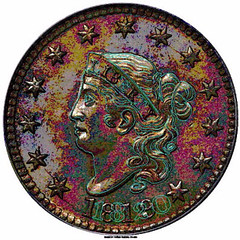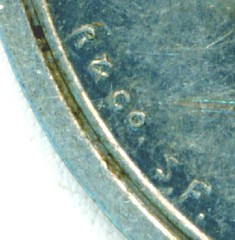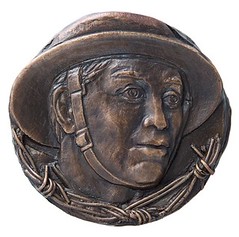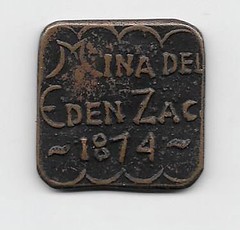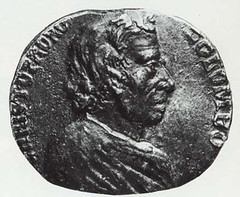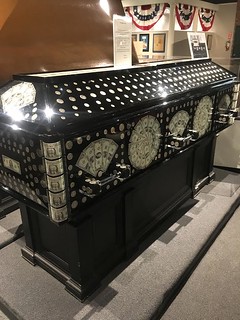
PREV ARTICLE
NEXT ARTICLE
FULL ISSUE
PREV FULL ISSUE
NOTES FROM E-SYLUM READERS: APRIL 23, 2017More on Hubs and Master Dies Before 1836
Regarding the post on hubs, I pretty much agree with Dannreuther. It's a bit of a chicken and egg question as to whether the Mint began with a hub or a master die in 1793. So few 1793 cent and half cent dies were created that it may not have been worthwhile to create a master die and then try to make hubs from that. The engraver may just have created a hub like a cameo; we can't be sure. The quality of the die steel was poor, and there was a substantial risk of breaking everything the more times you tried to punch something into steel. However, Robert Scot wrote in 1795 that his procedure was to engrave a master die and make hubs from that. So, there is no question that both hubs and master dies were in use WAY before 1836.
The Mint did experiment with complete hubs including the wreath, lettering and dentilation for the 1794 half cent reverses. They weren’t very successful. The next complete hub for a half cent was made in 1840. To read the earlier E-Sylum article, see:
Reininger & Co., San Francisco
In response to Dick Hanscom’s question, I imagine “R. & Co. S.F.” is Reininger & Co. This company was located at 420 Market Street in San Francisco. Products, according to a 21mm brass advertising token they issued, included Stencils, Checks, Rubber Stamps, Badges, and Box Brands. It is listed by Kappen as #2201. Thanks! Seems like a perfect match. -Editor
To read the earlier E-Sylum article, see:
American Medal of the Year Sales Boosted
As a result of your including the article about this year's winner of the American Medal of the Year, Susan Taylor sold four medals to your readers. She was delighted! Glad to help! Putting great medals in the hands of great collectors is all part of our promotion of numismatic knowledge. Thanks for letting us know. -Editor
To read the earlier E-Sylum article, see:
Male Outstanding Young Numismatist Award Winners Sought
I want to thank those who responded to my request for information last week. I was able to contact Leonora Dickson and we had a good phone conversation. We also were contacted by Paul Johnson who was named Outstanding Young Numismatist in 1972. He provided information on Canadian Young Numismatist Terri Roach. This week my attention turns to male young numismatists. The general problem is that web searches may turn up references to names but I have not been able to confirm those were the winners of the award. Do you know what happened to any of these winners? Jeffrey Coopersmith was from Washington D.C and was named Outstanding Young Numismatist in 1973. That year he testified before Congress in support of the"Hobby Protection Act." Larry Gentile, Jr. [1981] was the son of Larry Gentile Sr. and from New Rochelle, New York. John M. Greenslet [1983] was the son of Phil Greenslet from Reistertown, MD. David Massey [1986] was from Chamblee, GA. Matthew R. Zuckerman [1990] was from San Francisco. If you know an email address or where they can be found as a adult, contact Wayne who will forward the lead back to me. Thanks for you help, everyone. Pete's been making great progress with this excellent project. -Editor
To read the earlier E-Sylum article, see:
Fantasy Mexican Minas del Eden Token
But eventually some of them end up in the numismatic market, usually on the internet (where it may or may not be possible to convince the seller of his error - mostly not, since potential buyers cannot be warned or informed). The fact that some of these creations even made it into the catalogs that are used as standard references does not help either... Thank you. I didn't believe it was a necessity piece as described in the auction lot listing, and the token explanation I found was more plausible. It does look dodgy, but many
tokens are crude as made. Thanks for calling this out as a fantasy piece. -Editor
Ralf adds: Similar crudely made real tokens exist, which is why these are so easy to make (and make up). To read the earlier E-Sylum article, see:
1809 Golden Jubilee of George III Medal
With regard to the inquiry from E-Sylum reader Jacob Lipson of Montreal on the George III Golden Jubilee Medal BHM-642 (E-Sylum v20n16 April 16, 2017), I have the same medal, also in silver. I have had it for many years, and I kept it because it had such a nice portrait of George III. I would be interested in learning any more about it that Jacob Lipson might learn from the Ashmolean Museum. Photos of my medal are attached. 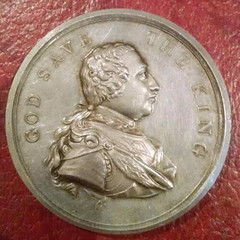 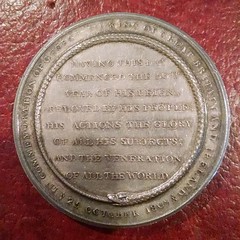 Thanks! -Editor
To read the earlier E-Sylum article, see:
A Medallic Portrait of Christopher Columbus
Dick Johnson submitted these notes on portraits of Christopher Columbus. Thanks! -Editor
"What did Columbus look like? No one knows. No portrait painted during the Admiral’s lifetime appears to have survived, but scores of later artists rendered their Columbuses." [It illustrated and described four of those numerous posthumous portraits.] The search did discover what is believed to be a contemporary portrait on a ... [wait for the finish of a drum roll please] ... A MEDAL! It is attributed to the collection of Richard Gaettens of Germany. The caption describes it: "(The medal) was made shortly before Columbus’s death. Then the discoverer’s voyaging was done, and he was vainly attempting to have his promised emoluments restored. The medal shows a man bent with age, face wrinkled from the rigors of life at sea." The medal was obviously cast. Striking with a die would have sharpened the image perhaps. But it is better each of us remember Columbus in our own way. See the National Geographic magazine November 1975 issue (page 618). I found the above image via an internet search using Dick's helpful reference to the Richard Gaettens
collection. -Editor
For more information, see:
To read the earlier E-Sylum article, see:
The Archival of Historic Odours
Relating to our earlier topic of studying the smells of old books and money, I came across this research article published April 7, 2017 in Heritage Science, the first
comprehensive scientific treatise of the subject. -Editor
We don’t know much about the smells of the past. Yet, odours play an important role in our daily lives: they affect us emotionally, psychologically and physically, and influence the way we engage with history. Can this lead us to consider certain smells as cultural heritage? And if so, what would be the processes for the identification, protection and conservation of those heritage smells? Our knowledge of the past is odourless. Yet, smells play an important role in our daily lives: they affect us emotionally, psychologically and physically, and influence the way we engage with history. Check out their handy-dandy book odour wheel... -Editor
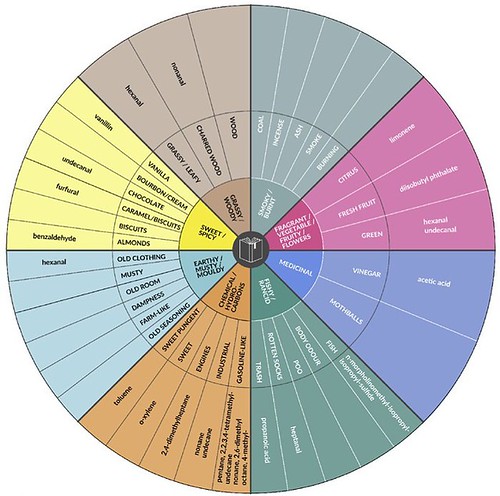 To read the complete article, see:
To read the earlier E-Sylum article, see:
The Money Casket
My daughter sent this picture she took of a casket in the National Museum of Funeral History in Houston, TX. Who knew such a place existed? I'll have to add it to my bucket list (the "kick the bucket" list). So maybe you CAN take it with you, after all... -Editor
 Wayne Homren, Editor The Numismatic Bibliomania Society is a non-profit organization promoting numismatic literature. See our web site at coinbooks.org. To submit items for publication in The E-Sylum, write to the Editor at this address: whomren@gmail.com To subscribe go to: https://my.binhost.com/lists/listinfo/esylum All Rights Reserved. NBS Home Page Contact the NBS webmaster 
|
